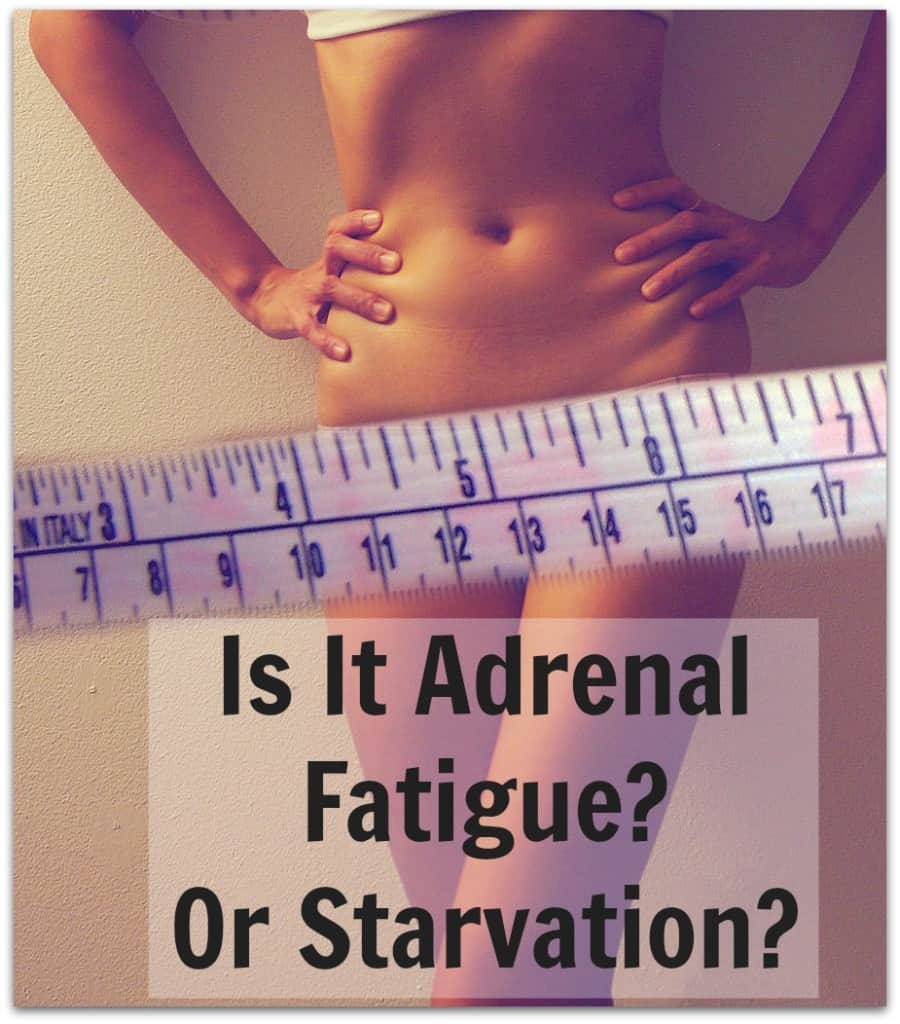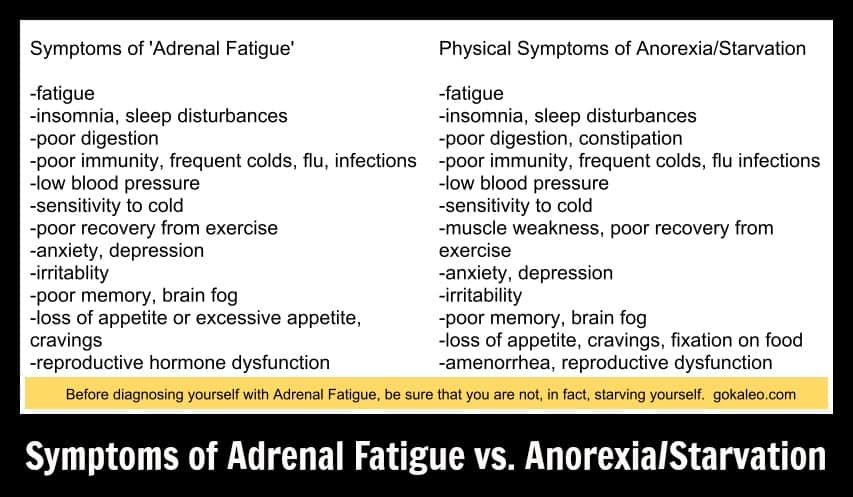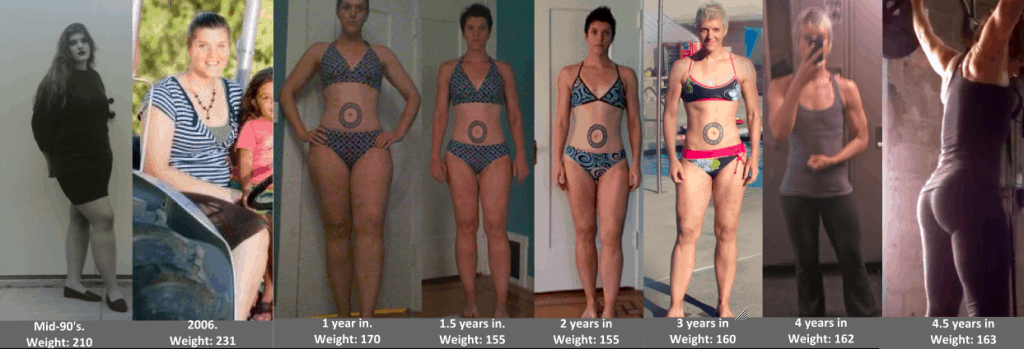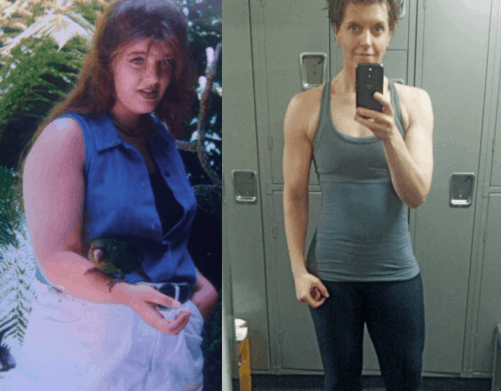Is It Adrenal Fatigue? Or Starvation?
Do you have adrenal fatigue? Or is it possible that you are just not eating enough? The symptoms of adrenal fatigue look almost identical to the symptoms of starvation or anorexia.

The following is a guest post by Amber Rogers from the Go Kaleo blog.
Do you have adrenal fatigue? Or is it possible that you are just not eating enough? The symptoms of adrenal fatigue look almost identical to the symptoms of starvation or anorexia.
Many people who find themselves drawn into novel dietary philosophies (or fad diets) have a long history of restrictive eating and weight fixation. These individuals have lost the ability to accurately gauge their hunger and satiety signals, and have frequently become conditioned to associate eating with feelings of guilt, shame and fear. Imposing further dietary restrictions on these people, as most dietary philosophies do, while ALSO telling them that calories don’t matter and to not pay attention to caloric intake, leads inevitably to a situation I’m seeing more frequently in my practice: people existing in a state of chronic semi-starvation.
They may fill their plates up with protein and vegetables (i.e., low calorie, filling, highly thermogenic foods) and believe they are eating “a lot”, but they are, in reality, shorting themselves of the calories their bodies need in the order of hundreds or even thousands of calories a day.
Not Eating Enough Calories Slows Metabolism
There has been ample research done into what happens on a metabolic and hormonal level when a person chronically consumes fewer calories than their body requires to function optimally and maintain a healthy weight, from the Dutch Famine studies, to the Minnesota Starvation Experiment, to more contemporary research on anorexia and bulimia.
In the beginning, weight loss is the primary response. But as time goes on, several negative endocrine adaptations begin to set in. Metabolic processes slow down. Organs and muscles are catabolized for their proteins; reproductive functions are shut down, endocrine function is compromised on every level as the body loses its ability to synthesize hormones adequately; digestive function goes haywire; immunity is suppressed; blood pressure plummets and the body becomes extremely sensitive to cold; brain fog, depression, anxiety and insomnia set in; the subject develops cravings and fixations on food and eating; the body becomes unable to recover from exercise, and more. These are established symptoms of starvation, supported by decades of research.
Contrary to popular perception, “metabolism” isn’t just how many calories your body burns. Metabolism is every single chemical process of every single cell of your body.
Symptoms of Adrenal Fatigue vs. Symptoms of Starvation
In my research I ran across an interesting research study done on high school and college students with a history of restrictive dieting. Researchers compared the students’ restrictive eating patterns and their physical and psychological symptoms with those experienced by the subjects of the Minnesota Starvation Experiment. They found that what is considered “normal dieting” is closely associated with the established health ramifications of semi-starvation. In other words, these young people who were voluntarily restricting their eating were experiencing the same symptoms as the subjects of the Starvation Experiment.
The list of symptoms associated with starvation is strikingly similar to lists of symptoms I’ve found on various websites selling adrenal fatigue treatments. In fact, the similarities are SO striking that I made a graphic to illustrate it:

Fad Diets Often Lead to Restricted Calories
I’m noticing a high correlation between restrictive dieting and adrenal fatigue diagnosis in my clients and readers. Most of these people aren’t consciously restricting calories, rather they’ve subscribed to one of the highly restrictive diets making the rounds of the fad diet industry right now, diets that restrict macronutrients, foods and/or entire food groups.
Dietary restrictions aren’t always a bad thing, but when they aren’t indicated as a treatment for a medical condition (i.e., when the person has no medical need for such restrictions), and especially when they are imposed on a person with established disordered eating behavior, I’m seeing them do far more harm than good.
More and more clients are coming to me exhibiting symptoms of, and frequently already having been diagnosed with, adrenal fatigue. But when I have them complete a 3-day food log, it becomes painfully obvious that these people aren’t consuming anywhere near enough calories to support their activity. They may be eating a pristinely “clean” diet, but they are starving.
I convince them to eat more, maybe add back in some foods they’ve been convinced are “unhealthy”, like oatmeal, fruit, and other energy dense foods, and suddenly their symptoms begin to resolve.
I’m not saying that all cases of adrenal fatigue are starvation, and these people are certainly ill. But I think a lot of people out there are restricting themselves into illness, and dietary philosophies that encourage hyperfocus on food quality while simultaneously dismissing the relevance of proper caloric intake are setting people up to fail. And even worse, many of the adrenal fatigue treatment protocols I see being sold online not only impose further dietary restrictions, they actively discourage any attention to caloric intake.
This is a huge mess! People exhibiting these symptoms should be increasing the variety and richness of their diets whenever possible, and ensuring that their bodies are getting not only the nutrients but also the calories necessary to support their activity and a healthy weight.

Stop Restricting Foods, Macronutrients and Calories
To move forward, we need to find a middle ground between Food Quality and the Calories-In-Calories-Out paradigm. We need to acknowledge the relevance of adequate calorie intake, we need to disassociate morality from food choices, and we need to learn to recognize and reject cultural conditioning that ties eating with feelings of shame and guilt.

Eating a healthy amount of (mostly) healthy food will lead to a healthy weight. That is how I did it. I didn’t restrict any foods or macronutrients, or restrict my calories below what my body needs to support a healthy weight. And over time, my body gradually stabilized at the weight my healthy intake supported.
Restrictive dieting can work for some people, specifically people with a medical need for such restrictions, but for the vast majority of us simply improving the quality of our diet (more whole foods, fewer processed foods), getting regular exercise (walking is the bomb!) and giving some attention to ensuring adequate and appropriate calorie intake is all that is necessary. Playing around with extreme restriction is more likely to harm than help.
Doing Everything Wrong
According to any of the various and sundry fad diets I tried, I am doing EVERYTHING wrong.
Here’s what I eat:
- I eat carbs. Lots of them. I have averaged 350-450 grams of carbs a day for the last 5 years.
- I eat fat. Avocados, peanut butter, full fat dairy, full fat salad dressing, etc. Fat typically makes up 30-35% of my daily calories.
- I eat grains. I enjoy oats, rice, corn and more. I even eat…
- WHEAT. I bake my own bread and partake liberally of the handmade scones from my local baking co-op. I eat pancakes and waffles and sourdough.
- I eat sugar. I have a serving or two of ice cream almost daily. I eat chocolate, and again with those scones.
- I eat soy. Tofu and Tempeh are some of my favorite foods They are not my primary source of protein, but I do eat them regularly.
- I also eat lots and lots of legumes. Legumes ARE my primary source of protein. Peanuts, lentils, beans, yum.
- I eat epic amounts of fruit. During the summer it’s not uncommon for me to make an entire meal of fruit.
- I don’t take supplements or rely on meal replacement powders or bars. I haven’t found any that rival real food for taste and nutrition.
A note from Cheeseslave: Remember, she’s not telling you this is what YOU should eat — this is just what SHE eats.

Share Your Comments Below
Whenever I read something Amber writes, it makes me want to don my sweats and swing my kettlebell. I’m so inspired by how she has transformed her body, her health and her life by eating real food, not restricting her diet, and simply by moving, lifting heavy things, and getting enough exercise AND enough food.
On that note, I’m headed out for a walk before breakfast!
What do you think about this guest post? Please share your thoughts and experiences below in the comments.
If you have questions for Amber, please ask in the comments.

About Amber Rogers of Go Kaleo: Faced with the consequences of a lifetime of poor eating habits and inactivity, Amber Rogers overhauled her life in her mid-thirties. By making better food choices and creating a habit of regular exercise, she succeeded in reversing decades of obesity and several chronic health conditions including depression and PCOS.
Along the way, she found a new career path and these days has a thriving Personal Training and Health Coaching practice.
On her blog, Go Kaleo, she shares her story and explores the powerful relationship between physical activity and metabolic health, in all its manifestations.
Amber lives in the San Francisco Bay Area with her husband, two daughters, and their rescued pit bulls, Fanny and Dexter. Her other interests include campy science fiction, reading and ice cream.
Photo credit: Flickr

Comments ()